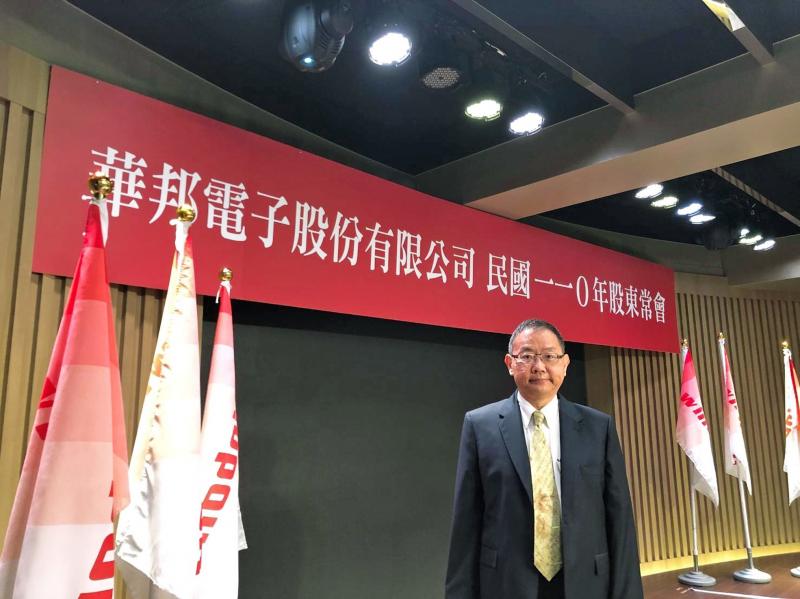Memorychip maker Winbond Electronics Corp (華邦電子) is ramping up recruitment efforts to meet increasing demand as its new fab in Kaohsiung is set to increase production next year, the Taichung-based firm said yesterday.
The chipmaker is planning to hire more than 400 engineers with various specializations for its fabs in Kaohsiung, Taichung, Hsinchu and Taipei, Winbond said in a statement.
The Kaohsiung fab is set to produce a small volume of DRAM chips in July next year in preparation for regular production in October, Winbond said.

Photo courtesy of Winbond Electronics Corp
The capacity expansion comes amid the chipmaker’s struggles to keep up with demand and more customers signaling interest in long-term supply deals.
The Kaohsiung 12-inch plant would have a target capacity of 35,000 wafers per month, with Winbond planning to install equipment in several stages, it said.
The firm is planning to invest NT$335 billion (US$12.08 billion) over a 10-year period, it added.
In the initial stage, the fab would be capable of making 10,000 wafers per month, using 25-nanometer technology, Winbond said.
Once the new facility starts regular production, it would boost the firm’s overall production capacity by 15 to 25 percent, Winbond said.
The chipmaker is planning to spend NT$11.8 billion on new facilities and chipmaking equipment this year, up from NT$790 million last year.
Winbond said it expects the capital expenditures to remain high next year as most manufacturing equipment would be installed then.
Winbond makes flash memory chips and DRAM chips, which each accounted for about half of the company’s memorychip revenue of NT$14.49 billion in the second quarter of this year.
The company is to conduct job interviews online next week, as it seeks to reduce in-person contacts amid the COVID-19 pandemic, it said.
Winbond has increased employee benefits to retain and attract chipmaking talent, as most local electronics companies, semiconductor firms in particular, are struggling to fill job vacancies, it said.
Since July, Winbond has been offering paid leaves for employees to get vaccinated against COVID-19 and deal with pandemic-specific needs, the chipmaker said, adding that COVID-19 treatment is covered in its in-house health insurance policy.

Intel Corp chief executive officer Lip-Bu Tan (陳立武) is expected to meet with Taiwanese suppliers next month in conjunction with the opening of the Computex Taipei trade show, supply chain sources said on Monday. The visit, the first for Tan to Taiwan since assuming his new post last month, would be aimed at enhancing Intel’s ties with suppliers in Taiwan as he attempts to help turn around the struggling US chipmaker, the sources said. Tan is to hold a banquet to celebrate Intel’s 40-year presence in Taiwan before Computex opens on May 20 and invite dozens of Taiwanese suppliers to exchange views

Application-specific integrated circuit designer Faraday Technology Corp (智原) yesterday said that although revenue this quarter would decline 30 percent from last quarter, it retained its full-year forecast of revenue growth of 100 percent. The company attributed the quarterly drop to a slowdown in customers’ production of chips using Faraday’s advanced packaging technology. The company is still confident about its revenue growth this year, given its strong “design-win” — or the projects it won to help customers design their chips, Faraday president Steve Wang (王國雍) told an online earnings conference. “The design-win this year is better than we expected. We believe we will win

Chizuko Kimura has become the first female sushi chef in the world to win a Michelin star, fulfilling a promise she made to her dying husband to continue his legacy. The 54-year-old Japanese chef regained the Michelin star her late husband, Shunei Kimura, won three years ago for their Sushi Shunei restaurant in Paris. For Shunei Kimura, the star was a dream come true. However, the joy was short-lived. He died from cancer just three months later in June 2022. He was 65. The following year, the restaurant in the heart of Montmartre lost its star rating. Chizuko Kimura insisted that the new star is still down

While China’s leaders use their economic and political might to fight US President Donald Trump’s trade war “to the end,” its army of social media soldiers are embarking on a more humorous campaign online. Trump’s tariff blitz has seen Washington and Beijing impose eye-watering duties on imports from the other, fanning a standoff between the economic superpowers that has sparked global recession fears and sent markets into a tailspin. Trump says his policy is a response to years of being “ripped off” by other countries and aims to bring manufacturing to the US, forcing companies to employ US workers. However, China’s online warriors